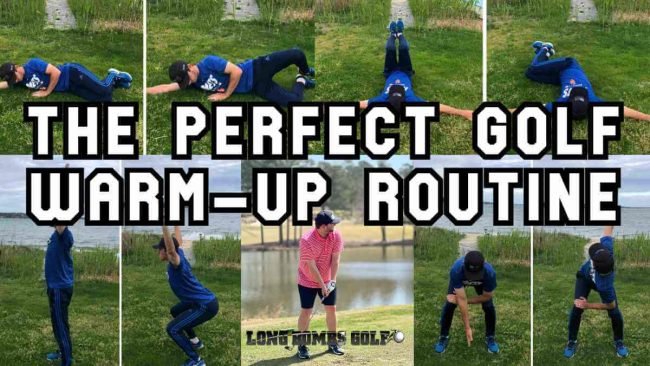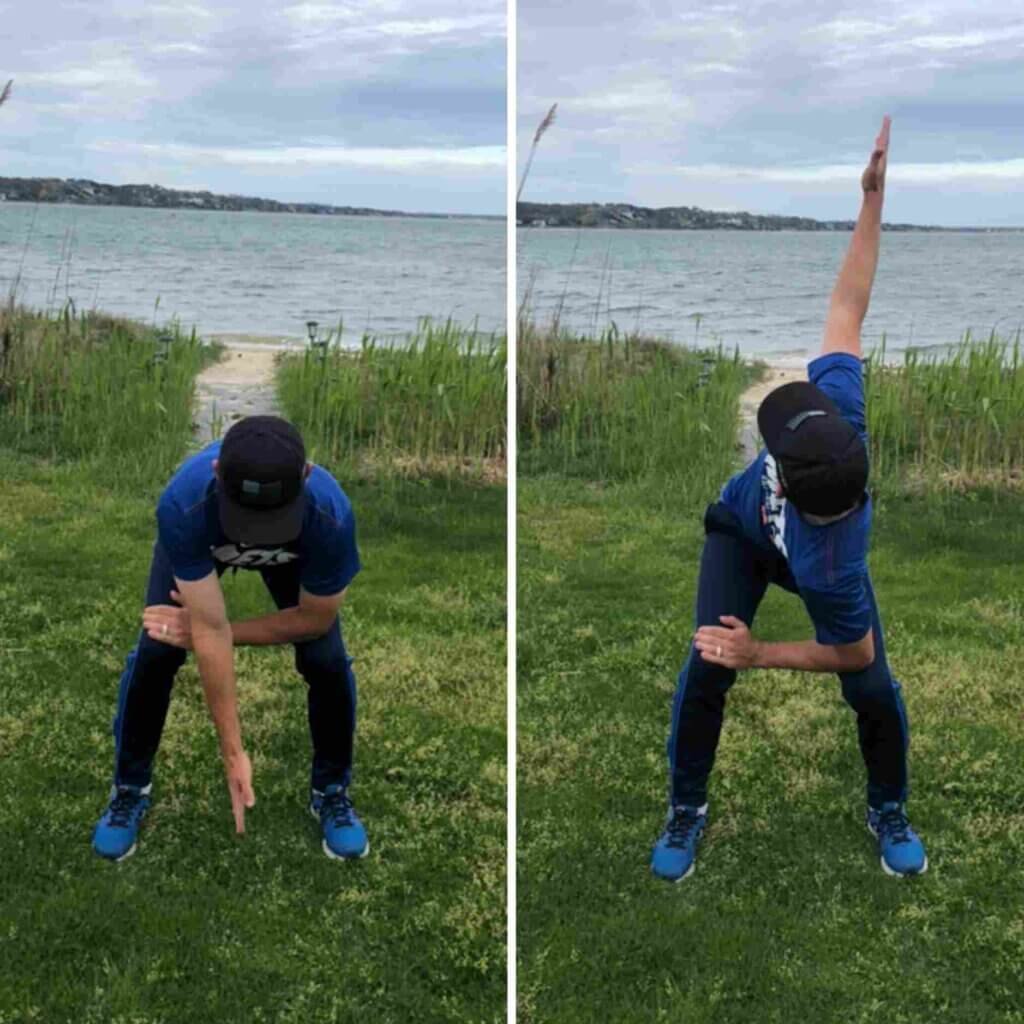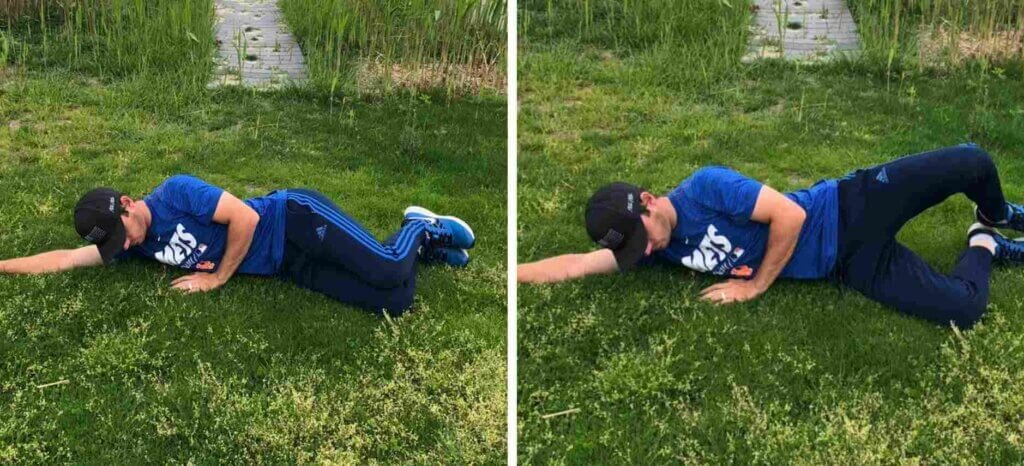
This page uses affiliate links. When you click an affiliate link, we get a small compensation at no cost to you. See Our Affiliate Policy for more info.
“How the Right Golf Warm-Up Can Make You Red-Hot”
It’s 8 a.m. The scent of freshly cut grass carries over on a gentle breeze – and with it, the tantalizing promise of birdies, skins, and merciless gloating. You’re taking your clubs out of your car under a cloudless sky. It’s going to be a great day.
You left yourself enough time to hit a few balls and roll a few putts before heading to the first tee. (Some mornings, time is not in our favor and lends to more of a sprinting-to-the-teebox kind of warmup.) But could your pre-round routine be incomplete? Are you getting the most out of that hour of prep to maximize your round? What percent of golfers break 80 and what is thri golf warm-up routine?
If you’ve ever invested time into a range session only to go out on the course straight after with the yips and yanks, you’ll know how much of a psych-op the range can be. That’s why I prefer to separate long range practices as their own day. If I’m going to be playing, I like to keep things short and sweet.
Don’t dwell so much on the technical side; focus on finding your feel and tempo. I like to start by holding two irons together and taking a few slowed-down swings. The added weight not only helps loosen up the muscles, but it will force you to make a more controlled swing. Another way to pinpoint your tempo for the day is to hit four shots: one at 25% of your max speed, the second at 50%, the 3rd at 75% and the last at 100%. Which one feels best? Oftentimes when we are out on the course, adrenaline and pressure take over our muscle movements and become the root cause of mistakes. By being conscious of good rhythm, it will translate onto the course in more relaxed swings.
I don’t like to hit more than 20 golf balls, either. I’ll hit a couple shots with each club, but my mainstay are my wedges. Being able to attack from 100 yards and in (and follow up with the putt) is the bread-and-butter of good golfers. By working more on my wedge play and seeking out targets on the range, it gives me a boost of confidence for the course that I can execute those plays, too.
If it’s not going well, I will throw some golf alignment sticks down to correct my alignment. Learn more about how to use golf alignment sticks here.
It’s no secret that putting is the literal make or break of a round. The top Tour players have, on average, 27 putts per round. That’s more than a third of their strokes coming from greens.
The real enigma to figure out before the round is speed. In a debate of line versus speed, speed wins every time. It doesn’t matter if the aim is perfection: if you don’t have enough speed to get to the hole (or conversely, blast it past), your chances of two-putting are slim. A couple of three-putts from misjudged speeds can be the difference between coming into the clubhouse disheartened and a breakthrough record score.
I recommend taking at least two balls onto the practice green. When I’m trying to nail speed, I like to putt from fringe to fringe. Not only are these long putts, but they’ll test accuracy as you try to keep the ball just inside the fringe (without going off the green). A brutal drill I’ll put myself through is the towel drill. Take your towel and fold it so it’s no more than a foot wide. Place it on the green and give yourself at least a fifteen-footer. The goal is to land the ball on the towel, which is a lot harder than it might sound. If the putt is too soft, it won’t get over the front ridge of the towel and will roll back; too hard and it will run off the back. You can increase the difficulty by narrowing the towel’s width or giving yourself a longer putt.
Aside from speed training, I like to give my ego a little boost. I’ll make as many three-footers in a row as I can to reinforce that assertiveness. That way when I have a similar putt during my round, I can think back to all the ones I already drained earlier and take some of the nerves away.
Though stretching may not be the first priority that comes to mind when thinking about golf, it couldn’t be more important to include in pre- and post-round routines. We’ve seen the GOAT himself out for multiple lumbar discectomies; in fact, back injuries are a growing problem amongst Tour pros, even for the young, spry guys.
That’s because a single golf swing generates the same amount of force on your spine as if you just got block-tackled from an NFL linebacker. Now, think about the repeat impact from dozens of swings, dozens of rounds. I don’t know about you, but I’m reaching for an ice pack right about now! The backswing is a rotation that turns the body into a coil, and the downswing generates electric speed and kinetic energy – plus a decisive crunch on your spine.
With that in mind, mobility work is crucial to avoid muscle fatigue and prevent injury.
Those opting to ride in a cart should take extra care; though you would think carrying a loaded bag to be more physically taxing, it’s easier to injure yourself taking a cart. According to chiropractor and certified TPI instructor, Dr. Jeffrey Poplarski, that’s because of the alternation between sitting idle and hitting. When you get out of your cart and immediately start swinging on stiff, cold muscles, it’s easier to pull things (and I’m not talking about the shot). He recommends putting your arms on the roof of the cart and leaning down to stretch your back and arms between shots.
This and other valuable knowledge I gathered from Dr. Jeff’s Saturday morning TPI classes at Bethpage. It was a way to undo the physical toll of my game. We did a combination of bodyweight and assisted movements to stretch out from head-to-toe. Not only did it feel good, but it was a great prep for the rest of the day. Here are some easy movements and stretches that you can do before your rounds, too:
Hold an iron by each end. Raise it above your head until your arms are fully stretched out. From there, squat down. Stay in the squat for a few seconds, then come back up. This will help elongate the thoracic spine.


Another good one for your back. Stand with your feet shoulder-width apart. Hinge forward. Put your left elbow on top of your left knee with your hand resting on your right knee. Extend your right arm down towards the ground. Rotate your right hand up and over your head with your eyes following. Switch sides and repeat.
To open up your hips, lie on the ground on your side. Stack your hips and shoulders with a slight bend in the knees. Keeping the hips stacked, slightly lift your top knee while keeping your feet together. Switch sides and repeat.


Lie with your back on the ground. Make sure it’s pressed flat into the ground to engage your core. Spread your arms out so that they form a ‘T’. With your feet slightly apart, raise them just off the ground. Roll your hips to one side and then the other. This is a nice lower-back stretch that also engages the core.
Keep a foam roller in your car. You can go onto the grass or find a spot inside the clubhouse. Starting with the back, put the roller under you and gently roll up and down to massage any knots out. You can put the roller under your glutes, hamstrings and calves, too, or flip onto your stomach to roll out the quads. This is a handy tool to have on hand for last-minute stretching.
You can also use a golf ball to loosen the muscles. Check out our foot massage with golf ball exercises here.
Even though mornings can be hectic, making time for an efficient warmup creates momentum for the round ahead. What’s more, forging a foundation from routine and an emphasis on health and longevity can propel one’s game to levels unseen. Learn more with our golf exercises at home article.